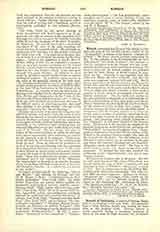

Konrad of Lichtenau, a medieval German chronicler, d. at Ursperg, in the year 1240. He descended from a noble Swabian family and resided for some time at the imperial court. Having become a monk, probably during a temporary residence in Rome at the court of Pope Innocent III, he entered the Premonstratensian Order, and in 1226 became Abbot of the monastery of Ursperg in Bavaria, where he died. For a long time he was reputed the sole author of the so-called “Chronicon Urspergense”, which narrates the history of the world from King Ninus to A.D. 1229. But critical investigation has shown that the work consists of several parts, of different authorship. The first part, to 1125, was written, in part at least, by Ekkehard of Aura (q.v.); a continuation, from 1126 to 1225, was added by Abbot Burchard (d. 1230), Konrad’s predecessor as Abbot of Ursperg. Then Konrad continued the work to 1229 and made the final redaction. Later continuators like Kaspar Hedio brought the chronicle down to 1537. The first edition was brought out by Miller and Foeniseca at Augsburg (1515) from a copy in the possession of Konrad Peutinger. Another edition by Melanchthon and Mylius appeared at Basle (1569). It was this edition that erroneously attributed the sole authorship of the chronicle to Konrad. The last edition was printed at Strasburg in 1609. The “Chronicon” was edited by Abel and Weiland in the “Mon. Germ. Hist.: Script.”, XXIII, 333-83; separate edition at Hanover, 1874.
ARTHUR F. J. REMY

